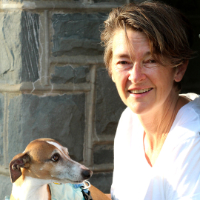
Associate Professor
Year Started at JMU: 2012
crowad@jmu.edu
Contact Info
Website: http://www.angelacrow.com
Angela Crow explores design, UX, and stories of freedom of movement, drawing on foundations in genre and literacy studies. She currently studies organizations and individuals who advocate for a shift away from car-centric infrastructure. She is particularly interested in their approaches on social media.
Education
Ph.D., English, Composition and Cultural Studies, University of Kansas, 1997
B.A., English and Business Administration (double major), Point Loma College, 1987
Publications
Books
Aging Literacies: Training and Development Challenges for Faculty." Cresskill: Hampton P. Series editors: Cynthia Selfe’s and Gail Hawisher New Dimensions in Computers and Composition Studies. 2006.
Field of Dreams: Independent Writing Programs and the Future of Composition Studies with Peggy O'Neill and Larry Burton. Eds. Utah State University Press. 2002.
Articles and Book Chapters
"Women-Only Bicycle Rides and Freedom of Movement: How Online Communicative Practices of Local Community Managers Support Feminist Interventions." in Composing Feminist Interventions: Activism, Engagement, Praxis. Eds. Kristine Blair and lee Nickoson. WAC Clearinghouse, 2018. 237 - 254.
“Assessing for Learning in the Age of Comparability: Remembering the Importance of Context” with Cindy Moore and Peggy O'Neill. Reclaiming Accountability: Improving Writing Programs through Accreditation and Large-Scale Assessments. Logan: Utah State UP, 2016. 17 - 35.
"Writing in an Age of Surveillance, Privacy, & Net Neutrality" with Este Beck, Heidi McKee, Colleen Reilly, and Stephanie Vie, deWinter. Kairos: A Journal of Rhetoric, Technology, and Pedagogy 20 (2) Spring 2016
“Googling Academe.” The New Normal: Pressures on Technical Communication Programs in the Age of Austerity with Time Giles and Janice Walker. Eds. Ed Nagelhout and Denise Tillery. Amityville NY: Baywood P, 2015. 159 - 176.
"Why Study Writing: Gaining Access to Rights to the Road" with Peggy O'Neill. Ed. Kishor Vaidya Writing for the Curious: Why Study Writing Canberra: Curious Academic P, 2015
“Managing Datacloud Decisions and ‘Big Data’: Understanding Privacy Choices in Terms of Surveillant Assemblages” Digital Writing: Assessment and Evaluation. Eds. Heidi A. McKee and Dànielle Nicole DeVoss. Logan, UT: Computers and Composition Digital Press/ Utah State University Press, 2013 http://ccdigitalpress.org/dwae/02_crow.html
“Recreation cyclists, drivers, and challenges to sharing the road: An analysis of an online exchange in the United States about rights to the road” with Ellen Broach. African Journal for Physical, Health Education, Recreation and Dance (AJPHERD) December 2012 (Supplement 3), pp. 15-22.
“Transnational Remembering: Navigating Fear and Racism, Shame and Nostalgia.” Entertaining Fear: Rhetoric and the Political Economy of Social Control. Eds., Catherine Chaput, M.J. Braun, and Danika M. Brown. Peter Lang: New York, 2010.
“Eye-Fixation Patterns of High- and Low- Span Young and Older Adults: Down the Garden Path and Back Again” with Susan Kemper and Karen Kemtes. Psychology and Aging (19.1) March 2004. 157–170.
“Introduction.” Field of Dreams: Independent Writing Programs and the Future of Composition Studies with Peggy O'Neill. 1 – 19. Utah State University Press. 2002.
“Wagering Tenure: Signing on with Independent Writing Programs” in Field of Dreams: Independent Writing Programs and the Future of Composition Studies. 213 - 229 Utah State University Press. 2002.
“Computers and Aging: Marking Raced, Classed, and Gendered Inequalities.” Journal of Technical Writing and Communication 32.1 (2002): 23 - 44. Crow, Angela. “Responding Queer” Kairos 6.2 (Fall 2001): on-line.
“SeniorNet, ThirdAge, and the Dominant Imaginary: Constructing Alternative Aging Aesthetics” Kairos 5.2 (Fall 2000): on-line.
Amy, Lori and Angela Crow “Shaping the Imaginary Domain: Strategies for Tenure and Promotion at One Institution” Computers and Composition. 17 (Spring 2000): 57 -68. (Publication listed alphabetically, equal contributors)
“What’s Age Got to Do with it?: Teaching Older Students in Computer-Aided Classrooms.” Teaching English in the Two Year College. 27.4 (May 2000): 400 - 406.
